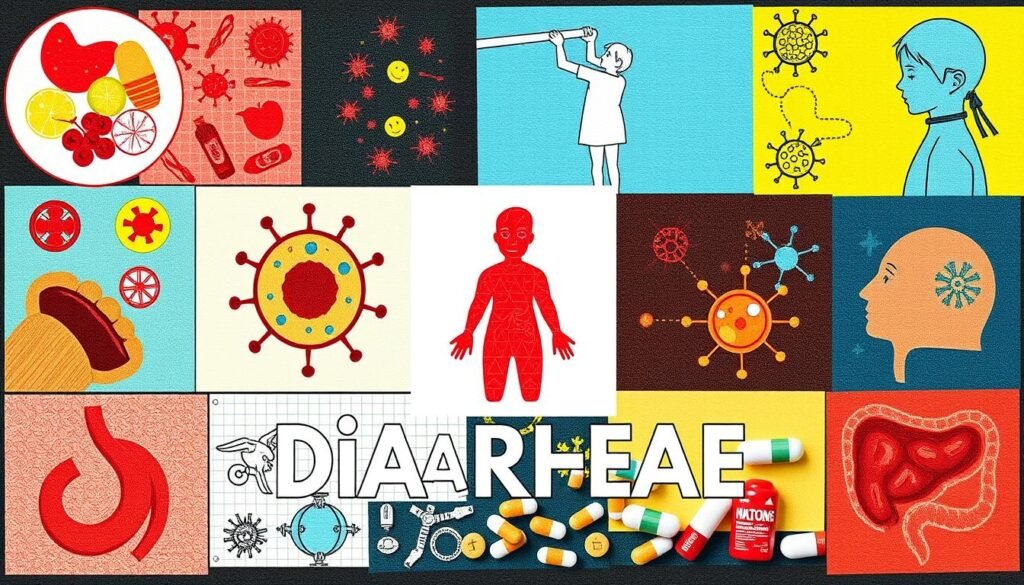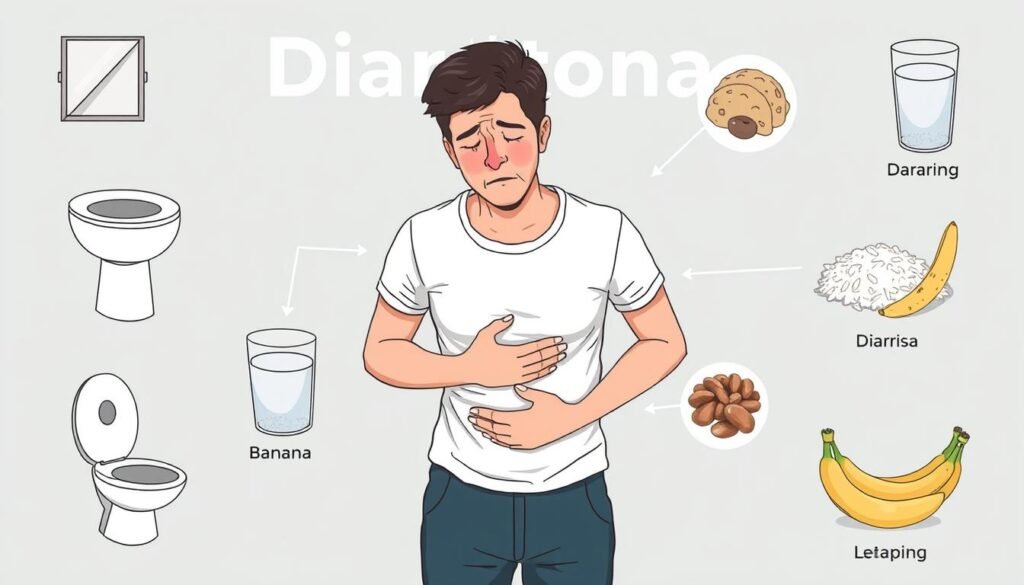Every year, about 48 million Americans get sick from eating contaminated food. This large number shows how common diarrhea is. It also brings attention to fatigue diarrhea. This is when you feel very tired and have loose stools at the same time. It usually comes from problems in your gut. Knowing how these two issues connect is key to feeling better fast.
Key Takeaways
- Fatigue diarrhea can lead to dehydration, particularly dangerous for vulnerable groups.
- Common causes include viral infections, bacterial disturbances, and medications.
- Understanding the symptoms of fatigue can help in seeking timely treatment.
- Hydration and dietary adjustments are essential for effective management.
- Immediate medical attention is necessary if diarrhea persists beyond two days.
Understanding Diarrhea: An Overview
Diarrhea means you often go to the bathroom with loose stools. If this happens three times or more daily, it’s considered frequent. Diarrhea comes from many reasons like infections, what you eat, and side effects from meds. If it’s short-term, it typically gets better in a day or two by itself. But if it stays for weeks, it might show bigger health issues. These issues could be irritable bowel syndrome or Crohn’s disease.
Diarrhea’s causes include bacterial and viral infections, eating certain foods, and meds. Travelers often get diarrhea from eating unsafe food or drinking bad water. It’s important to know that bad diarrhea might mean a severe health problem. This is especially true if it doesn’t go away.
One big issue with diarrhea is dehydration. Signs of dehydration are feeling very thirsty, not peeing much, and being tired. It’s vital to drink plenty during diarrhea to avoid dehydration. If not treated, dehydration can cause organ damage or even shock.
Doctors use tests to find out why you have diarrhea. These might include looking at stool samples or doing imaging tests. Getting the right treatment can include drinking fluids or taking antibiotics for certain infections. Taking care of your *gastrointestinal health* is key. Good care can lessen symptoms and stop other problems.
The Relationship Between Fatigue and Diarrhea
Did you know there’s a strong link between fatigue and diarrhea? When your body fights off diarrhea, it uses a lot of energy. This can make you feel very tired and weak. About 7% of fatigue cases are due to diarrhea. This is even more common in people with cancer who are getting treatment.
A study found a clear link between diarrhea and feeling drained, with a path coefficient of 0.267. It means diarrhea greatly affects your energy. The biggest impact was on how diarrhea makes fatigue worse, shown by a coefficient of 0.251. A look at 102 cancer patients showed diarrhea made their fatigue even worse.

It’s key to understand how these symptoms affect each other for better management. If you have ongoing diarrhea, it’s not just tiring but can also cause dehydration. This makes you feel even more fatigued. Taking care of both issues can really improve your life.
| Factor | Impact on Fatigue | Percentage Explained |
|---|---|---|
| Diarrhea | Increases exhaustion | 7% |
| Cancer Treatment | Exacerbates symptoms | Varies |
| Dehydration | Worsens tiredness | Noteable influence |
Common Causes of Fatigue Diarrhea
Exploring the common causes of fatigue diarrhea is key to managing it well. Many illnesses and conditions can upset your stomach and make you feel tired. Here are some main reasons.
Viral Infections and Gastrointestinal Distress
Viral infections are often behind diarrhea cases. In the U.S., the norovirus can quickly cause gastroenteritis. This leads to diarrhea, vomiting, and dehydration, making you feel worn out. Viruses like rotavirus and sapovirus are also big contributors to upset stomachs. Staying hydrated and knowing the signs are vital for getting better. Learning about these common diarrhea causes is useful for preventing them.
Bacterial and Parasitic Infections
Bacteria, like E. coli and Salmonella, can make you sick from bad food or water. They can cause intense stomach pain, diarrhea, and tiredness as you fight the infection. Parasites such as Giardia also lead to upset stomachs. If you travel, you’re more likely to get these infections and feel very tired from diarrhea.
Impact of Medications on Gastrointestinal Health
Some medicines, especially antibiotics, can mess with your stomach’s good bacteria. This imbalance might cause diarrhea and make you feel tired. Many prescribed or over-the-counter drugs can affect your gut health if mixed with certain foods. Knowing how medicines affect your stomach helps you manage or avoid these side effects better.

Symptoms Associated with Fatigue Diarrhea
It’s key to recognize the symptoms of diarrhea for effective care. Such signs can really affect a person’s health. Key symptoms include having watery stools, feeling abdominal pain, and being tired.
Physical Signs: Loose Stools and Abdominal Pain
Watery stools are a clear sign of diarrhea, leading to noticeable stomach pain. These signs often feel like cramps, alerting individuals they need help. Knowing these symptoms helps with getting timely help.
Understanding the connection between stomach pain and diarrhea is critical. It helps address issues, which could be due to infections or stomach problems.
Systemic Symptoms: Tiredness and Lethargy
Feeling tired is common with diarrhea, making people unusually sluggish. This is often because of losing fluids or nutrients, which lowers how well you can function. Spotting tiredness linked to diarrhea is key for deciding if you need a doctor.
Knowing these signs well improves when to seek help. This is especially true considering factors like stress or other health issues.
For more information on symptoms related to digestive health, consult this valuable resource.

| Symptom | Description |
|---|---|
| Loose Stools | Watery stools that may occur multiple times a day, typically recognized as diarrhea. |
| Abdominal Pain | Discomfort or cramps often associated with the digestive system’s distress. |
| Tiredness | General feeling of low energy, often resulting from dehydration or nutrient loss. |
| Lethargy | A state of sluggishness or reduced activity levels, commonly observed alongside tiredness. |
Consequences of Diarrhea: Dehydration Risks
Diarrhea can lead to quick dehydration, causing serious problems. It’s important to know the signs of dehydration. This knowledge helps protect those who are most at risk.
Recognizing Signs of Dehydration
Spotting dehydration symptoms early is key. Look for extreme thirst, dry mouth, dark urine, and tiredness. Infants might have a dry mouth and tongue. Older people could feel very thirsty, tired, and confused. Since symptoms differ, it’s critical to act fast when diarrhea occurs. For more info on dehydration, visit this link.
Vulnerable Groups: Who Is Most at Risk?
Certain groups face a higher dehydration risk. This includes young kids with severe diarrhea and vomiting, and older adults. People with diseases like diabetes or kidney problems also face higher risks. And, those who work out hard in heat need to drink more water because they sweat a lot. Preventing dehydration is crucial for these people to avoid diarrhea risks.
Relief Tips for Managing Fatigue Diarrhea
Dealing with diarrhea and the fatigue it brings can be tough. Yet, there are ways to ease these issues and aid your recovery. Keeping hydrated, tweaking your diet, and knowing which medicines to consider are key. These strategies help fight off the impacts of diarrhea.
Hydration Strategies to Combat Dehydration
Staying hydrated is crucial when you have diarrhea. You lose a lot of fluids. Drinking 8 to 10 cups of fluids daily is important. This replaces the water and electrolytes you’ve lost. Opting for water and drinks rich in electrolytes is great. Sipping on these often can lessen the dehydration diarrhea causes.
Dietary Adjustments for Improvement
Changing what you eat is vital when you’re dealing with diarrhea. Eating bland foods like bananas, rice, applesauce, and toast can help. It’s best to steer clear of high-fiber, fatty, and dairy foods. They can worsen your symptoms. The BRATT diet, which includes bananas, rice, applesauce, tea, and toast, is a gentle way to nourish yourself until you’re better.
Over-the-Counter Medications: When Are They Appropriate?
Medicines like loperamide can help with diarrhea symptoms, but use them carefully. Knowing when they’re right is essential for effective treatment. These meds can lessen watery bowel movements and control severe symptoms. Always talk to a healthcare provider before using them. This ensures your diarrhea management is comprehensive and safe.
When to Seek Medical Attention for Diarrhea
Diarrhea greatly affects daily life. Knowing when to get medical help is crucial. Sometimes, taking care of yourself just isn’t enough and seeing a doctor is needed to prevent worse problems.
Identifying Serious Symptoms
Spotting serious signs of diarrhea is crucial for your health. Some symptoms mean you need to see a doctor right away. These include:
- Severe abdominal pain
- Bloody or black stools
- Fever of 102°F or higher
- Signs of severe dehydration, like lightheadedness or dry skin
- Inability to keep food or water down
If you notice these, it’s important to seek help. This can stop things from getting worse.
Understanding When Self-Care Isn’t Enough
Managing diarrhea at home sometimes falls short. If it lasts more than two days or gets worse, call a doctor. This is very important if:
- Diarrhea lasts more than three days, which might mean something serious
- Individuals engaged in high-risk activities, like camping or swimming in natural waters, must be careful to watch for signs
If diarrhea won’t go away or if you’re getting dehydrated, it’s time for medical advice. Knowing when home remedies won’t work is vital for staying healthy and avoiding big problems.
Conclusion
Fatigue diarrhea shows how tummy troubles and tiredness are linked. Knowing the causes, like infections, is key. It helps to manage symptoms such as stomach pain and tiredness well.
When facing chronic diarrhea, watch for dehydration signs. Knowing when to get medical advice is crucial. It greatly helps your health.
Making small changes, like drinking more water and fixing your diet, can ease fatigue diarrhea symptoms. It’s important to talk with doctors to get advice that fits you. Also, knowing when to use over-the-counter meds can be a big help.
Staying on top of your health and acting on symptoms is vital. Whether it’s changing your lifestyle or getting medical help, handling fatigue diarrhea improves your life. It makes day-to-day living better and boosts your health.